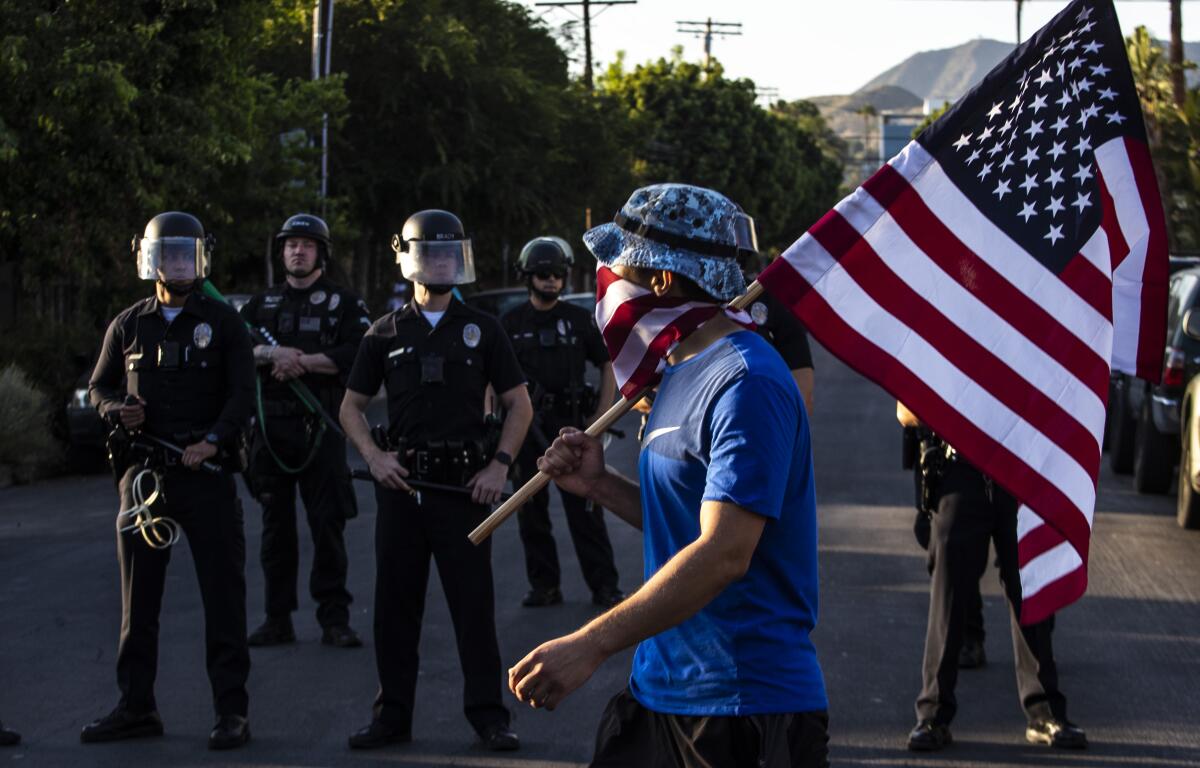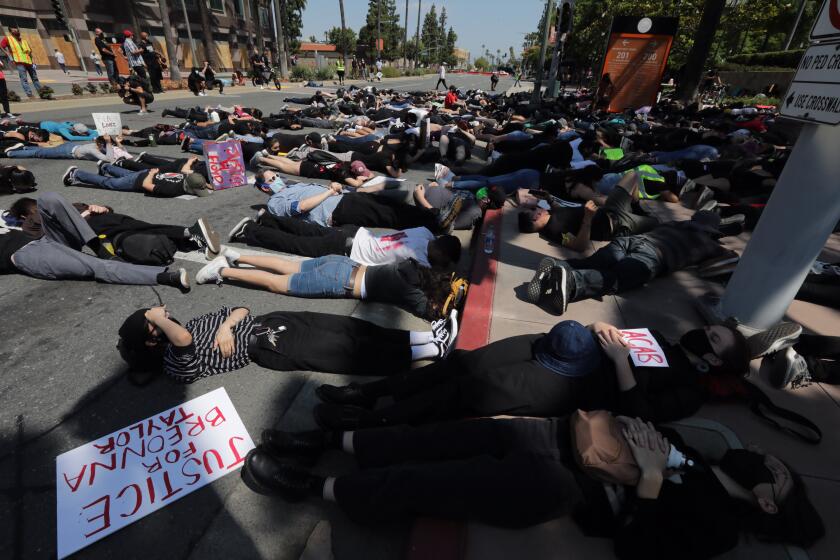How to be civically or politically active during a pandemic

Recent protests galvanized many to take to the streets championing a cause, but for many others in this election year, activism will happen at home.
And activists for a variety of candidates and issues are urging people — whether they broke quarantine to hit the streets or still haven’t left the house — that now is the time to act.
“Sitting around watching the news all day and people dying and police harming African Americans and COVID-19 killing people, it’s heartbreaking. But if you get involved with other people, you can find a way to at least be a small drop in that bucket that makes a positive difference,” said Gina Fields, chairperson of the Empowerment Congress West Area Neighborhood Development Council, representing the Baldwin Hills/Crenshaw area.
“The best way to feel better about the world is to get out and help.”
With partisan divides over issues such as immigration, healthcare and climate change, 2020 was already on track to be a very newsy election year. Then, like spotlights clicking on, the pandemic, economic devastation and demonstrations for racial justice showed leaders’ true colors during crisis.
“This is really judgment time on our candidates, our elected officials in seeing how they respond to everything — to the health concerns, to the economic concerns, to the community concerns,” said Randall Avila, executive director of the Republican Party of Orange County. “This is affecting us 360 degrees in our lives. It’s more important now than ever to get involved and to elect people that you trust.”
Voters upset about how leaders have handled the national crises should channel their anger into action, Avila advised.
“This is it,” agreed Jon Katz, president of the Santa Monica Democratic Club. “Either this country is going to be completely ruined or we can have a chance of saving it.”
While many of the issues affecting the U.S. are national or even global in scale, most roads to change begin locally. The federal and state governments supply money and give guidance, but local officials carry out health orders, set police department budgets and coordinate the economy’s on-the-ground reopening, for example.
“Presidential elections are sexy,” said Jane Wishon, political vice president for the Stonewall Democratic Club. “Everybody wants to talk about the presidential election. But the president doesn’t pick up my trash.”
How do I start?
If you’re a first-time volunteer, don’t be intimidated, Wishon said. Look up your representatives at the city, county, state and congressional levels and sign up for their newsletters. Determine what issues matter to you (renters’ rights? schools?) and tell your representatives or chosen candidates about them in a phone call, email or online message.
“It’s the election of our lifetime,” Wishon said. “So much is at stake that we can’t just sit back and say, ‘Oh well, it’s a pandemic. I guess we just won’t make calls.’”
Most political parties or candidates for elected office have a volunteer button or contact information on their websites. To get involved with a political party, search for their state or local chapter online. From there, you can sign up to volunteer, attend a meeting, donate or sign an online petition of support.
Of course, it’s also possible to exercise your civic muscle without picking a political party. In Los Angeles, anyone can attend meetings of the 99 neighborhood councils, which advise the City Council and inform residents on hyper-local issues. Depending where you live, the city council or county board of supervisors may be the best place to learn about decisions that affect you.
Mary Spadoni, who has lived in Costa Mesa more than half of her 75 years, religiously attends City Council meetings to opine about policy or act as a political watchdog and levy critiques against council members. She recommends tuning into the television or online stream of local council meetings and, at first, just observing how they are run. Then voice your opinion by calling in or writing a comment.
“We all want to wave the flag and be part of the process, and I think that our local government is the ground floor of the process,” Spadoni said. “This is like the breeding grounds for tomorrow’s politicians and tomorrow’s future, locally. We’re a democratic building block.”
As nearly two weeks of protests have shown, in-the-world activism is alive and well despite the coronavirus crisis. But for those choosing to remain home because of fear of catching or spreading the coronavirus, Audrena Redmond, one of the founders of the Black Lives Matter Long Beach chapter, said there is plenty of work to do — starting with yourself.
Get your hands on books, engage in webinars and follow reputable organizations on social media, she advised. Tune into a podcast or audiobook while you walk around your neighborhood. “Bored out of [her] mind at home,” Redmond began carrying a notebook wherever she goes, to jot down questions or ideas to research later.
“Now is the time to spend a little time educating yourself,” Redmond said.
“A lot of folks hesitate because they say, ‘Well, I just don’t know enough,’ or ‘I’m not sure.’ Well, now’s the time to get sure.”
Since George Floyd died, black people are getting messages and money from white people they barely know. Here are the dos and don’ts of being a white ally.
What will I do when I get involved?
Fields’ neighborhood council has organized a South Los Angeles-specific Black History Month celebration, a park cleanup, a City Council candidate forum and a fire safety day, among other events. When the pandemic struck, her team pivoted to distributing food to homebound seniors and collecting diapers for new parents. Now, they are coordinating safety patrols for a planned protest honoring George Floyd this weekend.
Getting involved from home can be easy. Once you’re connected to a group or cause you care about, the options for activism are many.
You can start by picking up your phone and calling a family member, Redmond said. Engage in difficult conversations about current events.
You may choose to attend an in-person rally, but you won’t be signing up people to vote at the canceled Orange County Fair or canvassing door-to-door for a candidate as in past years. Instead, you may be writing postcards or participating in social media campaigns. Some groups have held virtual rallies, bike and car parades, and teleconference community meetings.
Local chapters of political parties have also ramped up text- and phone-banking operations. Volunteers enjoy it, people can participate remotely from across the country, and more voters respond, Katz said.
“Those remote calls, they’re king right now,” Avila said, noting that the answer rate has increased at least 15% since the pandemic. “People are at home. We have a little bit of a captive audience, if you will, and people are eager to interact with someone.”
Virtual politicking will never replace door-knocking, but it may free up time to reach more voters. In past elections, Katz sometimes spent 10 hours a day braving Southern California traffic, collecting campaign materials, driving to neighborhoods and knocking on doors.
“We were actually only canvassing for like two hours, and during that time, maybe half of the doors didn’t open at all. It’s like the whole day is completely spent. You get home, you just want to go to bed,” Katz said. “On the other hand, texting and calling from home, I could have been reaching voters the entire time.”
One more thing
How you get involved is up to you, but there is one simple act a citizen can do: vote. In California, the deadline to register for the Nov. 3 election is Oct. 19.
More to Read
Get the L.A. Times Politics newsletter
Deeply reported insights into legislation, politics and policy from Sacramento, Washington and beyond. In your inbox three times per week.
You may occasionally receive promotional content from the Los Angeles Times.












